Covid-19: As cases surge across Europe, here’s how countries are limiting the spread
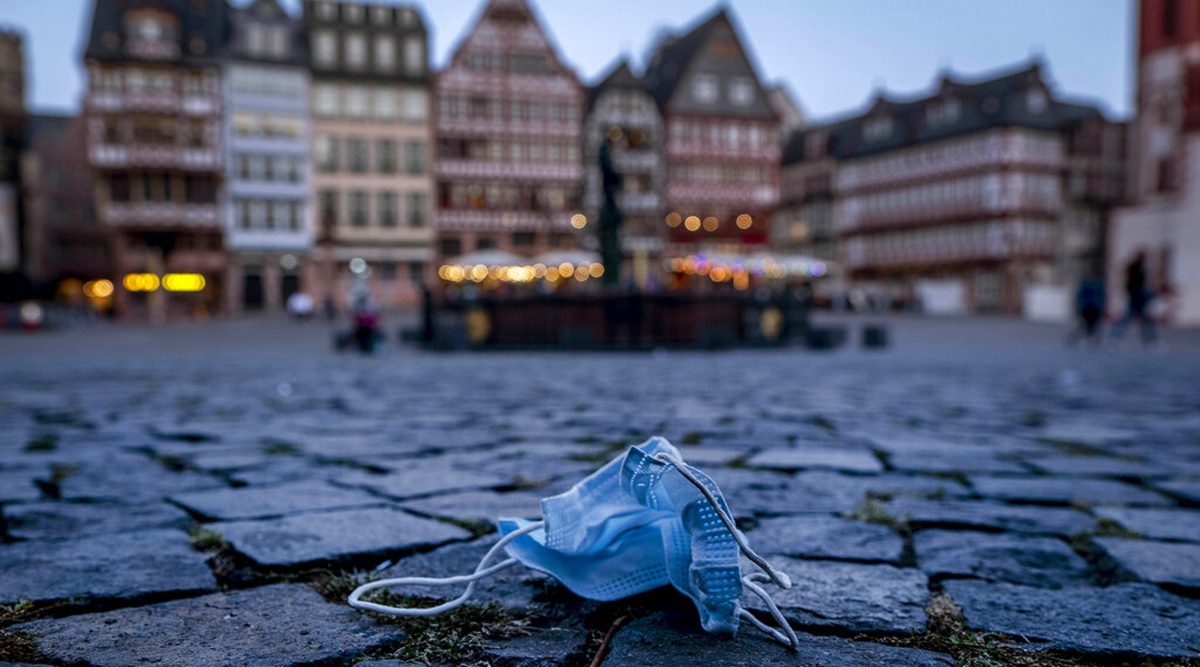 A face mask left in Roemerberg square, that is usually crowded by tourists, in Frankfurt, Germany, Thursday, Sept. 17, 2020. (AP Photo/Michael Probst)
A face mask left in Roemerberg square, that is usually crowded by tourists, in Frankfurt, Germany, Thursday, Sept. 17, 2020. (AP Photo/Michael Probst)Coronavirus cases in Europe: As the global coronavirus caseload crossed the 30 million mark and the World Health Organisation (WHO) warned of “alarming rates of transmission”, countries across Europe have begun rolling out new restrictions to curb the spread of the deadly infection.
After Europe reported a record 54,000 new infections in one day last week, WHO’s regional director for Europe Hans Kluge said that the recent surge “should serve as a wake-up call” for the entire continent, AFP reported.
Although the numbers reflect more comprehensive testing, it also shows alarming rates of transmission across the region,” Kluge said in a press conference in Copenhagen, Denmark.
Read: ‘Europe could likely see second coronavirus wave in Autumn’
According to the WHO, more than five million cases and over 228,000 fatalities have been recorded across Europe since the onset of the pandemic.
With most of Europe witnessing an aggressive second wave of coronavirus infections, governments are now in the process of reintroducing restrictions that were earlier eased following initial lockdowns.
Here’s a look at new Covid-19 rules imposed across Europe
UK: Ban on socialising with people outside household and ‘support bubbles’
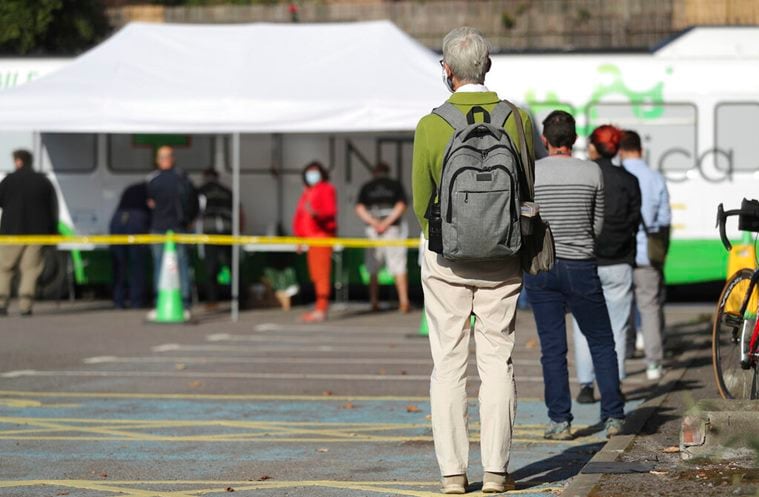 Coronavirus in Europe: Students and staff queue up outside a mobile coronavirus testing unit for asymptomatic staff and students set up in a car park at the University of Portsmouth, Portsmouth, England, Friday Sept. 18, 2020. (Andrew Matthews/PA via AP)
Coronavirus in Europe: Students and staff queue up outside a mobile coronavirus testing unit for asymptomatic staff and students set up in a car park at the University of Portsmouth, Portsmouth, England, Friday Sept. 18, 2020. (Andrew Matthews/PA via AP)
Amidst a surge in Covid-19 cases in north east England, British Health Secretary Matt Hancock announced that tighter restrictions would be imposed in the region from Friday onwards. Residents in the area are no longer allowed to socialise with people outside their households and support bubbles, AP reported.
Global Coronavirus Updates, Sept 18: Cases top 30 million
Hancock added that leisure and entertainment venues will remain closed between 10 PM and 5 AM, and only table service will be permitted at restaurants and bars. The new restrictions will affect residents of Northumberland, North Tyneside, South Tyneside, Newcastle-upon-Tyne, Gateshead, Sunderland and County Durham, the Guardian reported.
The United Kingdom is struggling to cope with a sharp rise in cases in recent months. According to Britain’s Health Minister Edward Argar, hospital admissions are doubling every eight days, DW reported. However, UK authorities are reluctant to reveal whether a nationwide lockdown will be imposed next month.
Spain: Masks remain mandatory even for school children
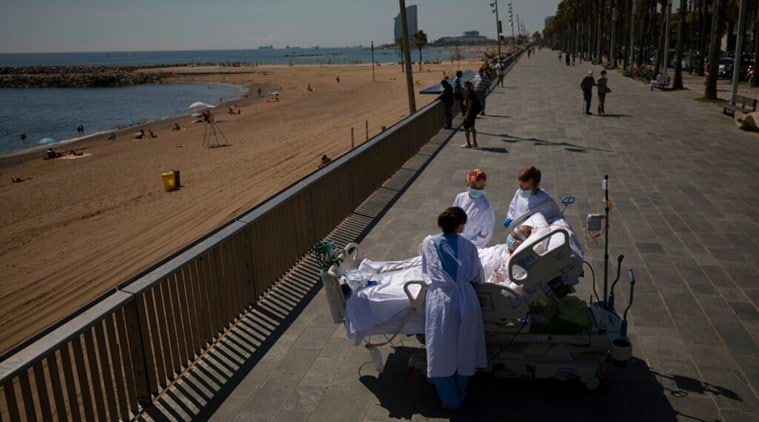 Coronavirus in Europe: Francisco España, 60, is surrounded by members of his medical team as he looks at the Mediterranean sea from a promenade next to the “Hospital del Mar” in Barcelona, Spain, Friday, Sept. 4, 2020. A hospital in Barcelona is studying how short trips to the beach may help COVID-19 patients recover from long and traumatic intensive hospital care. (AP Photo/Emilio Morenatti)
Coronavirus in Europe: Francisco España, 60, is surrounded by members of his medical team as he looks at the Mediterranean sea from a promenade next to the “Hospital del Mar” in Barcelona, Spain, Friday, Sept. 4, 2020. A hospital in Barcelona is studying how short trips to the beach may help COVID-19 patients recover from long and traumatic intensive hospital care. (AP Photo/Emilio Morenatti)
As schools begin to reopen following months of closure, the Spanish government has made it mandatory for all children over the age of six to wear masks in class and in most public places, BBC reported. However, just as the school year began the country witnessed a sharp rise in Covid-19 cases, according to an AP report. Masks are mandatory for everyone in most parts of Spain.
In Madrid, which has quickly become the centre of the country’s coronavirus outbreak, local authorities fear that their public health systems cannot possibly accommodate the rampantly rising number of Covid-19 cases. Officials have said that one in five hospital beds are occupied by coronavirus patients, amidst a second wave of infections.
A new set of restrictions will be unveiled in the city on Friday, AFP reported. Regional health chief Antonio Ruiz Escudero said the Madrid government was working on a series of measures “to restrict mobility and reduce activity in certain areas.. where the virus is most-widely transmitted”.
France: No more than 10 people can gather in a public place
 Coronavirus in Europe: People wearing protective face masks as precaution against the conoravirus line up to get a seat at a bistro along the Seine river bank in Paris, Thursday, Sept. 17, 2020. Health Minister Olivier Veran announced 20 more testing centers nationwide as he told a press conference that the virus is “very active again” in France. (AP Photo/Michel Euler)
Coronavirus in Europe: People wearing protective face masks as precaution against the conoravirus line up to get a seat at a bistro along the Seine river bank in Paris, Thursday, Sept. 17, 2020. Health Minister Olivier Veran announced 20 more testing centers nationwide as he told a press conference that the virus is “very active again” in France. (AP Photo/Michel Euler)
With France recording over 10,000 new cases each day in recent weeks, the government has strictly prohibited public gatherings of more than 10 people. Wearing a face mask has been made mandatory in some badly-affected areas and towns, including Paris, Marseille and Lyon, BBC reported.
Mask wearing is also compulsory in a majority of French workplaces. The rule applies in factories and offices where a number of people share space.
While bars and restaurants have been reopened with strict health measures in place, nightclubs remain closed. Stadiums and race tracks were permitted to reopen to the public in July with a limit on the total number of people who can attend an event.
Also Read: Virus clusters at French universities give Europe a lesson
On Thursday, the country recorded 10,593 new cases — the highest number of cases recorded in a single day, BBC reported. Authorities in two of France’s biggest cities Lyon and Nice have been given until Saturday to impose new mandates to contain the disease.
Germany: Mandatory airport testing for foreign travellers
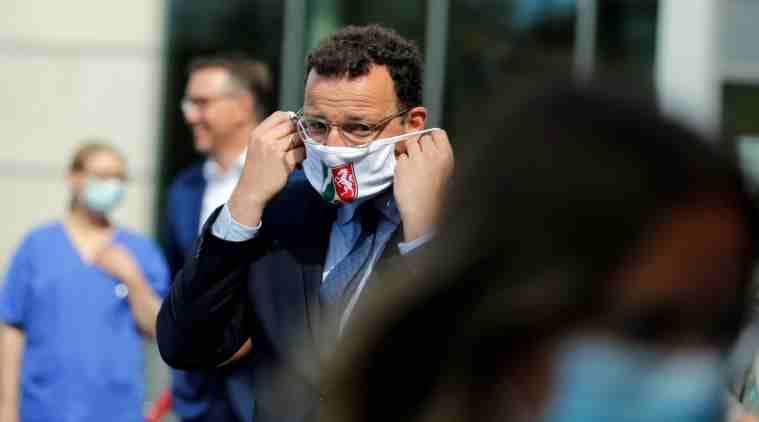 German Health Minister Jens Spahn takes off his mask during a visit to Bethany Hospital to get an update on treatment options for coronavirus disease (COVID-19) patients and speak with medical staff in Moers, Germany, August 28, 2020. REUTERS/Leon Kuegeler
German Health Minister Jens Spahn takes off his mask during a visit to Bethany Hospital to get an update on treatment options for coronavirus disease (COVID-19) patients and speak with medical staff in Moers, Germany, August 28, 2020. REUTERS/Leon Kuegeler
Multiple coronavirus testing booths have been set up in airports across Germany to test travellers from high-risk countries. Travellers landing in Germany from a high-risk area will have to self-isolate for 14 days, DW reported.
Further, a minimum fine of 50 euros has been imposed for people caught in shops or public transport without face masks or coverings, BBC reported. German authorities have also extended the ban on large gatherings until the end of the year.
While the country has recorded a significantly lower number of cases than its neighbours in Europe, health experts fear that herd immunity is unlikely at a national scale for now. According to the German Health Minister Jens Spahn, herd immunity will be reached through a coronavirus vaccine, which could possibly be available by mid-2021, AFP reported.
Czech Republic: All bars and restaurants ordered to close at midnight
The Czech Republic is currently bearing the brunt of a second wave of infections, that is far more brutal than the first. In an effort to contain the surge, the Czech government on Thursday announced that all bars, restaurants and nightclubs must remain shut between midnight and 6 AM.
Authorities also banned more than 10 people from assembling in an indoor space, AP reported. All those attending a gathering are required to be seated and wearing masks. Every visitor is required to have a ticket for the seat that they are occupying.
Mask wearing is also compulsory for all children who are attending school. Dozens of schools were shut down once again after the number of cases began rising in the country, the AP report stated.
In view of the sudden spike in cases, countries like Slovakia, Denmark, Switzerland and Britain have imposed travel restrictions on people arriving from the Czech Republic.
Belgium: Government launches next phase of reopening
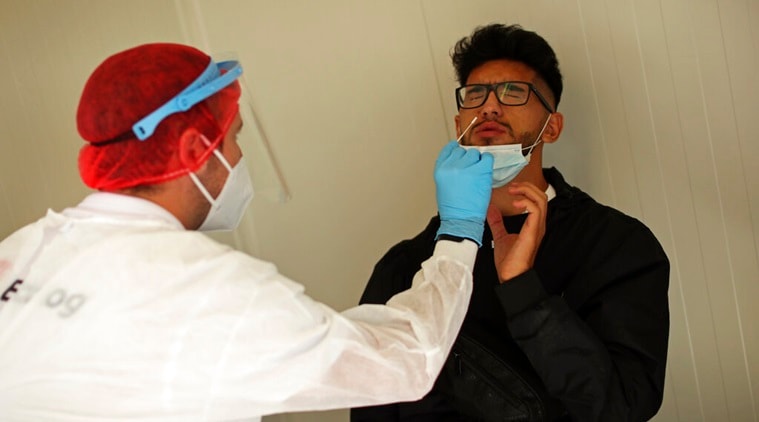 A medical worker wearing full protective gear, takes a nose swab from a passenger who recently landed, to be tested for COVID-19 in a test centre at Zaventem international airport in Brussels, Thursday, Sept. 17, 2020. (AP Photo/Francisco Seco)
A medical worker wearing full protective gear, takes a nose swab from a passenger who recently landed, to be tested for COVID-19 in a test centre at Zaventem international airport in Brussels, Thursday, Sept. 17, 2020. (AP Photo/Francisco Seco)
Belgian authorities have begun reopening public places like libraries, shopping malls, cinemas, museums, religious buildings and public transport. But wearing a face mask remains mandatory in almost all public places.
Discotheques and nightclubs remain closed and big events, like festivals, are not yet allowed, BBC reported.
With stadiums reopening, football fans can return to watch their favourite sport live once again. However, upper limits have been set on the number of people who can attend a match.
Netherlands: People asked to maintain 1.5 metre distance, even at home
To prevent the spread of coronavirus, Dutch authorities have urged all residents to maintain 1.5 distance when people come to visit you at home. The distance rule also applies in public places — such as shopping streets, parks and recreational areas.
Several major cities, including Amsterdam and Rotterdam, have chosen to scrap schemes that made wearing face masks compulsory in public places. Meanwhile, children began returning to schools in the country in August. While social distancing rules have not been enforced in schools, a number of hygiene measures have been put in place.
📣 The Indian Express is now on Telegram. Click here to join our channel (@indianexpress) and stay updated with the latest headlines
For all the latest World News, download Indian Express App.
© IE Online Media Services Pvt Ltd
tinyurlis.gdclck.ruulvis.netshrtco.de
